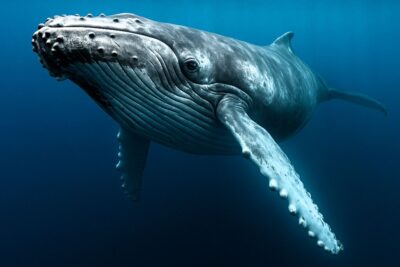 Whales are the giants of the ocean, awe-inspiring, mysterious, and vital to Earth’s ecosystems. At Vero Q&A, we explore how these massive marine mammals do much more than inspire wonder. They actually help keep our planet alive and thriving.
Whales are the giants of the ocean, awe-inspiring, mysterious, and vital to Earth’s ecosystems. At Vero Q&A, we explore how these massive marine mammals do much more than inspire wonder. They actually help keep our planet alive and thriving.
Whales: Giants with a Global Role
Whales are among the largest animals on Earth. Blue whales, for instance, can grow over 100 feet long and weigh nearly 200 tons. Yet despite their size, their most powerful impact is invisible, they help regulate climate and nurture ocean ecosystems.
Whales and the Carbon Cycle
One of the most surprising roles whales play is in the carbon cycle. When whales feed at depth and come to the surface to breathe, they release “whale poop” rich in iron and nutrients. This fertilizes plankton, tiny organisms that absorb massive amounts of CO₂ and produce over half of the world’s oxygen.
More whales mean more plankton growth, which means more carbon removed from the atmosphere, a natural climate solution powered by nature.
Ocean Engineers
Whales are sometimes called “ecosystem engineers” because their movement redistributes nutrients across the oceans. Their vertical diving patterns help circulate minerals and oxygen from deep water to the surface, nourishing countless species.
Even after death, whales contribute when their bodies sink, they create “whale falls,” feeding deep-sea life for decades.
Supporters of Marine Food Chains
By feeding on krill, fish, and plankton, whales help maintain balanced marine populations. Predatory whales like orcas keep prey species in check, which protects coral reefs and fish nurseries. Every part of the food web benefits from a healthy whale population.
Cultural and Economic Value
Whales are icons in many cultures, symbolizing strength, wisdom, and peace. They also support eco-tourism industries, generating billions through whale-watching tours that inspire conservation without exploitation.
Threats to Whales Today
Despite their importance, whales face growing threats:
- Commercial Whaling: Though banned in many countries, illegal hunts continue.
- Ship Strikes: Collisions with vessels are a leading cause of whale deaths.
- Noise Pollution: Sonar and engines disrupt whale communication and navigation.
- Plastic Pollution: Ingested plastic causes internal injuries or starvation.
- Climate Change: Melting ice and warmer waters disrupt feeding and migration patterns.
Why Are Whales So Important to Our Planet’s Health?
1. How do whales affect the climate?
By fertilizing plankton, which absorb carbon and produce oxygen, whales help reduce global warming.
2. What is a whale fall?
It’s when a whale dies and its body sinks, providing nutrients for deep-sea ecosystems.
3. Are whales endangered?
Many species are still endangered due to hunting, habitat loss, and ocean pollution.
4. What’s the biggest whale?
The blue whale is the largest animal to have ever lived on Earth.
5. How can I help protect whales?
Support marine conservation groups, reduce plastic use, and advocate for sustainable fishing.
6. Do all whales eat plankton?
No. Baleen whales eat plankton and krill, while toothed whales eat fish, squid, and other marine animals.
Whales are more than ocean giants – they are silent stewards of Earth’s life support system. At Vero Q&A, we believe protecting whales means protecting the health of our oceans and climate. Their survival is our survival.